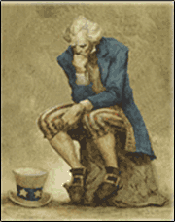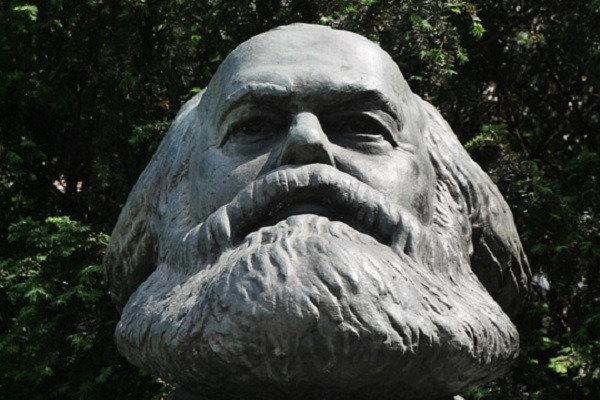
–>
August 7, 2022
Throughout the 1800s, the world’s dominant philosopher was Georg Wilhelm Friedrich Hegel (1770–1830). He thought the universe was a logical machine, like a steam engine.
‘); googletag.cmd.push(function () { googletag.display(‘div-gpt-ad-1609268089992-0’); }); }
Hegel and his contemporaries agreed that Nature contains an underlying structure. The Hegelian dialectic was all the rage for a century. These philosophers wanted to sound scientific and mathematical. First thesis meets second thesis, producing third thesis.
Karl Marx (1818–1883) absorbed this thinking and concluded that history itself is a logical machine, like a cash register. Events do not happen randomly. There are laws — and Marx alone could explain them.
For Marx, the big predictions were about capital — i.e., money. He probably wrote a thousand pages, but his answers came down to a simple diagram. Capitalism works almost too well. Industrialists could acquire fortunes, but that is the trap. Capitalists are greedy bloodsuckers who reduce workers not just to poverty, but to starvation and desperation. Inevitably, according to Marx, workers rise up in righteous wrath, kill the industrialists, and divide the money among the workers, ushering in a communist paradise.
‘); googletag.cmd.push(function () { googletag.display(‘div-gpt-ad-1609270365559-0’); }); }
The problem for communism is that Marx had a flimsy theory to promote, and he could be reckless about it. Almost everything done in his name, as we’ll see, was dishonest. He hacked his own history machine.
Karl Marx laid down an important parameter from the get-go. To have a proper communist revolution, you need a successful industrial country, like the U.S., England, Germany, France and…that’s about it. Obviously, you couldn’t have a Marxian revolution in agrarian backwaters like Russia, China, and Cambodia, as you would simply divide poverty among impoverished peasants. Ergo, all the big communist revolutions were illegitimate and could not have been caused as Marx prescribed.
The next problem was that despite Marxian analysis and predictions, the capitalists were spreading the wealth. Almost any entity with excess money will invariably build parks, public housing, schools, museums, handsome municipal buildings, etc. One of the richest industrialists in American history (Andrew Carnegie) personally built 1,600+ libraries! This inevitability is captured in the phrase “trickle-down economics.” Marxists use this phrase sarcastically so maybe people won’t realize that it points to the central truth.
Here’s where the story gets really interesting. There was a lot of agitation in the 1820s and 1830s, especially in England, demanding that the government raise standards and protect workers. In fact, change was happening. Governing bodies passed new laws every year. So what did Marx and his polemical partner Friedrich Engels do?
Paul Johnson, author of the splendid book Intellectuals, devotes a chapter to illuminating how Marx and Engels complained that society was getting worse each day, even as their own evidence revealed the opposite. They had an Armageddon mindset and didn’t want to give it up. Rich swine must swing from every lamp post.
Johnson comments:
‘); googletag.cmd.push(function () { googletag.display(‘div-gpt-ad-1609268078422-0’); }); } if (publir_show_ads) { document.write(“
It is not always clear whether Engels’s misrepresentations are deliberate deception of the reader or self-deception. But sometimes the deceit is clearly intentional. He used evidence of bad conditions unearthed by the Factories Enquiry Commission of 1833 without telling readers that Lord Althorp’s Factory Act of 1833 has been passed, and had long been in operation, precisely to eliminate the conditions the report described.
Johnson elaborates elsewhere:
Marx cannot have been unaware of the weaknesses, indeed the dishonesty, of Engels’s book since many of them were exposed to detail as early as 1848 … in a publication with which Marx was familiar.
The Wall Street Journal calculates that communism is responsible for more than 100,000,000 deaths over the last hundred years. Communists always stress the peace on Earth that communism will give us as the state withers away. Everybody, we are promised, will get exactly what he needs. Clearly, there is a glorious revolution to push through, and the end justifies the means. Ruthless behavior might be required. Stalin mildly observed that a death may be a tragedy, but a million deaths is only a statistic. Mao chastised his followers: “A revolution is not a dinner party, or writing an essay. … A revolution is an insurrection, an act of violence by which one class overthrows another.”
My impression is that communism makes people violent because it’s such a volatile mix of religious certitude and utter amorality. Or the kind of people attracted to the free-for-all that is communism at the top seem to be vicious people at the outset — people like Stalin, Mao, Pol Pot, and (it’s a safe bet) the leaders of today’s CCP.
Finally, there is a constant need for sophistry, propaganda, and manipulative language. These vices corrupt everything they touch, as we see now throughout our society. Marx himself was a bossy academic adventurer, rarely scientific but always insisting that he was Science. Compare Fauci.
Paul Johnson has a field day quoting what contemporaries thought of Marx:
There are many descriptions, mainly hostile, of the furious Marx in action. One close observer even wrote a poem about him: “Dark fellow from Trier in fury ranting, / His evil fist is clenched, he roars interminably, / As though ten thousand devils had him by the hair.” … Annenkov, who observed him in court, described his “thick black mane of hair, his hairy hands and crookedly buttoned frockcoat”; “he had no manners, was proud and faintly contemptuous”; his “sharp, metallic voice was well suited to the radical judgment he was continually delivering on men and things”; everything he said had a jarring tone.
Marx himself did not reject violence or even terrorism. Addressing the Prussian government in 1849, he threatened: “We are ruthless and ask no quarter from you. When our time comes we shall not disguise our terrorism.”
In the testimony about Marxist political aims and behavior, from a variety of sources, it is notable how often the word “dictator” crops up. “An unusually intelligent Prussian police agent who reported on him in London noted: ‘The dominating trait of his character is an unlimited ambition and love of power. … He is the absolute ruler of his party. … He does everything on his own and he gives orders on his own responsibility and will endure no contradiction.'”
Johnson also quotes Mikhail Bakunin: “Marx does not believe in God but he believes much in himself and makes everyone serve himself. His heart is not full of love but of bitterness and he has very little sympathy for the human race.” Now, 150 years later, that’s the malevolent Marxian DNA we are left to endure.
The Democrat party discarded most of its moderate members and should be renamed the American Communist Party. If Hubert Humphrey, Adlai Stevenson, and John F. Kennedy showed up at a conference today, they would probably not be admitted. If they were, they would feel dirty.
Bruce Deitrick Price’s new novel is Frankie, about a harmless robot designed to have meaningful conversations with humans. What can go wrong? (Visit Frankie.zone.)

Image via Pixabay.
<!– if(page_width_onload <= 479) { document.write("
“); googletag.cmd.push(function() { googletag.display(‘div-gpt-ad-1345489840937-4’); }); } –> If you experience technical problems, please write to [email protected]
FOLLOW US ON
<!–
–>
<!– _qoptions={ qacct:”p-9bKF-NgTuSFM6″ }; ![]() –> <!—-> <!– var addthis_share = { email_template: “new_template” } –>
–> <!—-> <!– var addthis_share = { email_template: “new_template” } –>







